Beekeeping is one of the oldest and most popular economic agricultural activities in Georgia, and its sustainable development remains among the key priorities for the country’s economic growth. What’s more, the local honey is well-known for its special taste and healing characteristics.
Helping local beekeepers to acquire innovative technologies, deepen their knowledge, develop skills and connect them with international markets of the EU and other countries is vital, and, to help Georgia achieve this, Czech non-governmental organization People in Need, Czech Development Agency, Tbilisi City Hall and Union Association Agora joined forces. This union resulted in the opening of a modern beekeeping center in Tbilisi back in April, boasting laboratories of international standards with all the necessary equipment for scientific activities and studies.
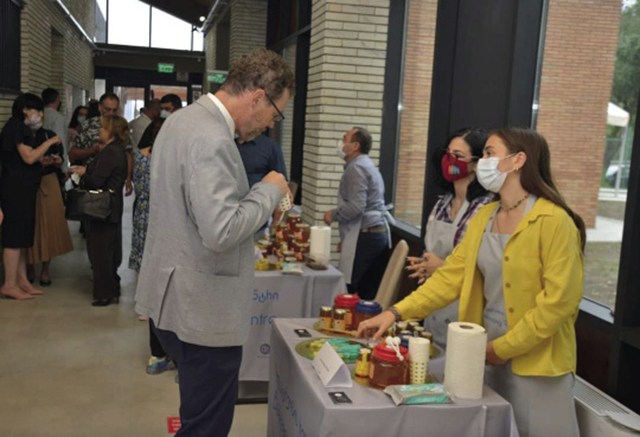
On July 29, to mark the official launch of the facility’s activities, People In Need organized a Multifunctional Regional Beekeeping Center Event in Tbilisi, in cooperation with the Embassy of the Czech Republic in Georgia, Tbilisi City Hall and Union Association Agora.
As part of the event, the parties signed a bilateral agreement between the Czech Development Agency (CzDA) and Agora to establish the terms of their partnership and affirm continuous support to the Beekeeping Center.
Mr. Jan Chernik, Head of Development Coordination at the Embassy of the Czech Republic to Georgia, took part in the ceremony on behalf of the Czech Development Agency, and Mr. Tengiz Svanidze signed the document as a representative of Agora.
“I’m delighted to be here and see the progress of such an important project implemented with Czech Development Agency support, through the joint efforts of PIN, Association Agora and the City Hall,” said Dion Battersby, People in Need Country Director. “This Center is expected to strengthen the local beekeeping sector, which makes us proud and delighted.
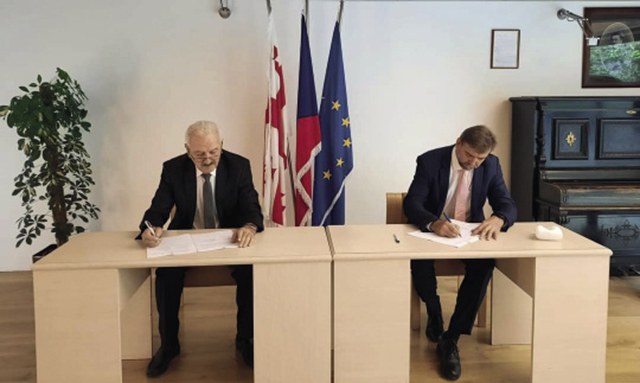
“The project ‘Sustainable Development of Beekeeping in Georgia 2018-2020’ aimed to strengthen the beekeeping sector locally and open a multifunctional regional beekeeping center. The project was implemented in cooperation with the Embassy of the Czech Republic, Tbilisi City Hall and Agora.”
“Today, the BageBee Center, a multifunctional and scientific, educational facility, launches operations,” said Chernik. “Future steps are training of beekeepers and support of export of honey to the European Union and other countries. We’re here with Tbilisi City Hall to whom I’d like to express gratitude, as well as to Czech-based organization People in Need. They did a great job educating beekeepers in the regions of Georgia. Our partner is also the Ministry of Agriculture. The beneficiary organization of this facility is Agora. The Czech Development Agency supported construction and training and also the capacity building of laboratories of the Ministry of Agriculture and Environment Protection. This is a big packet of activities supporting beekeeping in Georgia, which I see as potential for future economic growth. The main principle is to connect Tbilisi with rural beekeepers and connect them with international trade and markets.
“The BageBee Center, equipped with the latest equipment and modern technologies, is a result of this fruitful cooperation. Notably, being located in the Bagebi district of Tbilisi, the name is also related to the location, which is considered a relatively “green” area in the city. The location of the center once again highlights the importance of doing business in an eco-friendly environment and in accordance with sustainable development principles, and making Tbilisi as much of a green city as possible.”
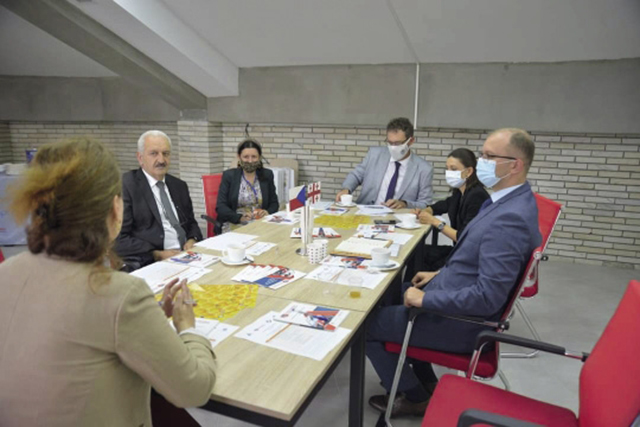
The event was also attended by representative of the City Hall, Vakhtang Lomjaria, who positively assessed the Center’s contribution to sustainable development of beekeeping in Georgia and praised the efforts of the parties involved in this work.
“The kick-off or operations represents a new stage in the project progress,” he said. “This Center was opened in April, and we already see tangible results. Tbilisi City Hall welcomes the implementation of such an agricultural project in the urban space. It is especially important and necessary for Tbilisi, which is overloaded in terms of urban development. This is yet another step taken toward the development of green economy, green city and sustainable development. From the side of City Hall, this piece of land in Bagebi was handed over to the relevant international and local partners with an investment obligation. These partners faithfully fulfilled their obligations, and today we have a high-tech, well-developed beekeeping center, supporting the sector and honey export to reach new heights.”
Yet another important contribution of the Center is that it cares for the training and professional growth of local farmers using the latest technologies and equipment. As part of this initiative, several local farmers, including the young generation, have been trained by the professionals of the field, which saw them receiving both practical and theoretical knowledge, while a number of them are currently employed at the Center as trainers and help others grow.
“A very good thing was done in Bagebi: a very beautiful and good building was built – the regional center of beekeeping. We called it regional because before the construction of this building, we cooperated with the Union of Beekeepers of the region in both Azerbaijan and Armenia. The center will offer the introduction of new technologies in beekeeping, all the innovations that exist, and the training of beekeepers. I think a very good thing has been done,” said Tengiz Svanidze, director of the Agora Association.
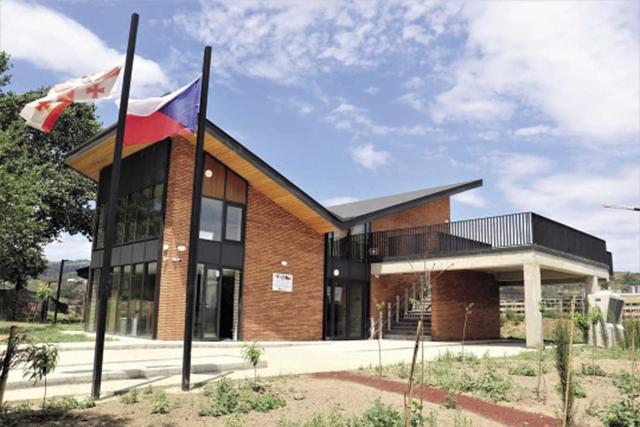
GEORGIA TODAY spoke to one of the trained BageBee beneficiaries, 26-year-old Lika Janiashvili, who elaborated on the benefits she had received as a result of training.
“Considering that I already have a certain experience in beekeeping, the training available here increased my qualification in the direction of bee milk production. Further, my relationship with bees became more familiar and closer during this period,” Janiashvili told us. “As part of the training, we underwent both theoretical and practical courses. I’m already employed in the laboratory at the Center, producing bee milk, which is very healthy and beneficial.
“In the future plans of this center, artificial insemination of queen bees is also included, which I’m also interested in. The activities of the BageBee Center will significantly support the strengthening of agriculture.
“Further, in an urban environment, development of agriculture at such a scale is no less important. Following our example, we might inspire more and more people to get involved in agricultural activities and move closer to nature. Establishing more “green points” in Tbilisi is crucial for its residents and the forming of a healthy environment,” she said.
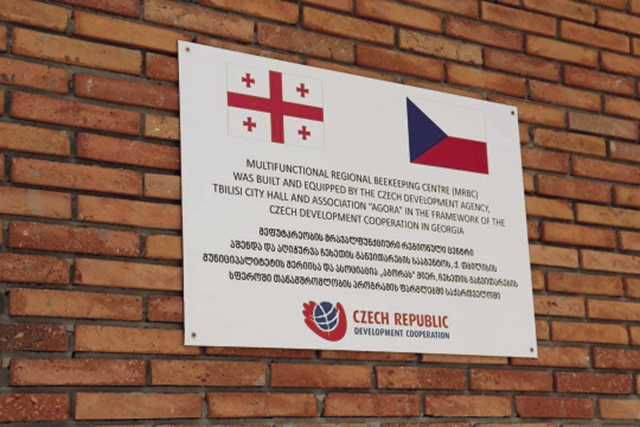
The strategic vision of the BageBee Center is rooted in just that: rural/urban connectivity, sustainable agriculture, and in a vision of Tbilisi as a Green City. The key principles of the Center are environmental appreciation, sustainable resource use, and inclusive growth. And, of course, the Center’s principal vision is to be a main player in Georgia’s growing beekeeping sector.
Georgia is one of the Czech Republic’s development cooperation partners. Over the past 10 years, the nature of cooperation has evolved from humanitarian assistance through post-war reconstruction to the current scheme that supports stability and the successful integration of Georgia into the European Union.
The current Bilateral Development Cooperation Program (2018-2023) is an integral part of the Czech Republic’s comprehensive engagement in Georgia. It sets out to promote democratic, economic and social reforms and to assist Georgia on its path towards the EU, as well as to strengthen the Czech Republic’s bilateral relations with the country including more intensive cooperation between national and local governments, NGOs and private entities.
In 2021, the People in Need (PIN) focus is on the organizational capacity of the BageBee Center and the Union-Association Agora team, aiming for a gradual transfer from PIN to Agora of all organizational responsibilities by the end of the project. The extension includes a significant expansion of PIN’s roles and responsibilities within this timeframe, requiring up-close work with Agora staff at the BageBee Center.
All the above joint efforts serve the purpose of increasing honey export from the country and helping its agricultural sector to develop and strengthen for the well-being of its citizens.
By Ana Dumbadze














